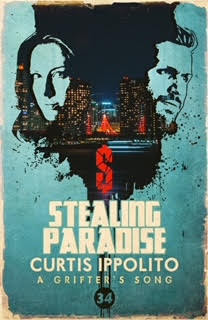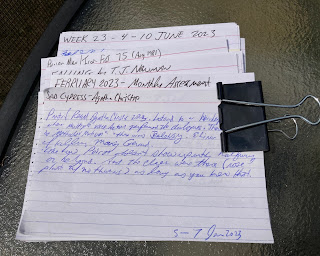The Grifter's Song series is awesome.
The recipe, taking some of the best crime writers working today, from up and comers to heavyweight stars, give them a word count range that could go between a long short story to a full on short novel, set each in a different place, and then let the writers go with two of the most interesting, complicated, ripoff-artists the genre has ever seen, as they pull a new con in each entry; whats not to love?
I've been blessed to have my own work featured in the series, in my short novel, THE LOW WHITE PLAIN, but I've been even more blessed to read so many entries written by my friends. S.A. Cosby (you might have heard of him, James D.F. Hannah, Holly West, Nick, Nick Kolakowski, and now, Curtis Ippolito.
Curtis, the writer of BURYING THE NEWSPAPER MAN, and an Anthony Nominated Short Story writer, joins The Grifters Song saga with a fantastic entry, STEALING PARADISE. I read it in a single sitting, and I am not kidding you when I tell you that it's exactly what you're gonna be craving when it drops in the dead of summer. It's perfect pool-side reading. You can hear the waves in the pages.
Always cool, Curtis and I stayed up late last night, texting about the book, the responsibility of taking on an entry in the Grifters Song series, and San Diego. We'll get to that below, but first, let's check out the back cover copy of STEALING PARADISE, and then the cover!
Sam and Rachel are taking a much-needed and deserved break in America's Finest City—San Diego. Staying at the legendary Hotel Del on Coronado Island, the couple hack their way into a free suite, swanky spas, and numerous other luxuries. But that's where the scams cease. Rachel has enacted a mantra of "observe but don't act," intended to allow Sam time to decompress and recover—and it's working. But true to their nature, when a con too easy to pass up comes along, all other intentions are quickly discarded. Once a young businessman brags about increasing his net worth over the pandemic through the windfall of small business loans from the Federal government he had forgiven, the couple hatch a simple con to lighten his load some. After some cozying up and planning an "investor presentation," they seem poised to net an easy payday of six figures. The only hitch? A disgruntled former employer also has Sam and Rachel's mark in his sights, unknown to them. Will his unwelcome presence not only kill the con but spell doom for them all?
Yeah. That sounds awesome. Now. The cover!
STEALING PARADISE will be available on August 15th.
Make sure you preorder it now. And when you're done, check out my conversation with Curtis, below:
PAUL: You’re one of the final entries in A Grifters Song, and you’ve delivered a banger. How did it feel to step into this world so many of our genres best writers have played in?
CURTIS: Man, at first it was so intimidating following the likes of S.A. Cosby, Gary Phillips, Holly West, James D.F. Hannah, and so many others including YOU! Have to admit, Paul, after I read your entry I was petrified of writing one. Yours raised the bar so damn high. But once I finally got over that anxiety and gave myself the freedom to write a story with my voice, in the setting I love, and with a scenario that I was confident with, I really loved it. I will be forever grateful to Frank for the invite to play the world he created with these epic characters.
PAUL: And you delivered a great one!
One thing I was curious about while reading your entry - you handle the history of the Sam and Rachel, and their future, so so well. I don't think it’s a secret your entry is one of the final entries in A Grifters Song before Frank wraps it all up. Did knowing your entry would be that close to the end increase the pressure you felt? Did Frank give any special instructions, or present any kind of path he hoped you’d take?
CURTIS: Thanks! I think knowing my mine was the penultimate episode really helped me with their background and hinting at the future. Frank was great and said to go for whatever I wanted to do. If I went too far, he’d let me know, but other than that there were no guardrails. So I made it a point to focus on teeing up Frank for his last episode. I also felt I needed Sam and Rachel to be doing some reflecting, feeling the weight of those 33 previous adventures and all the ones in between not put on the page. That’s part of the reason I decided to start them off on vacation. This season of A Grifter’s Song has punched the piss out them. They needed a break, but of course, master con artists can’t stay out of the game too long.
PAUL: And what better place to take a break than San Diego? One of my favorite parts of the series is that the location is different for every single one, and that the location is always reflective of the author. And, knowing you, and how you travel, how you’re in town one day and the desert the next, and then the mountains after, I really wasn’t sure what you were going to do. As you were writing about San Diego again, was there anything in particular you wanted to show about the city? Anything in particular you felt like you hadn’t covered in your writing before?
CURTIS: Deciding where in San Diego to set the story really started with wanting to drop Sam and Rachel at a resort location. A place they’d have “free” access to pampering. And the most recognizable spot here for that is the Hotel Del. It’s iconic. Marylyn Monroe shot a movie there. They set up an ice rink out back in the winter. I meant, how fucking arrogant. An ice rink on the beach, in 60 degree weather. Palms swaying, the best surf of the year rolling… The Del oozes opulence. And I wanted those two Great Whites there in the middle of it all, trying to take a break from the life, but smelling a constant fresh supply of chum in the water.
Also, the location—Coronado Island—I have not written about it any of my other work. So yeah, that was a motivator too. And I have a lot more to say about that part of town at some point in the future.
PAUL: Speaking of the future, what’s next after A Grifters Song? I know you’ve got a novel you’ve been working on. Can you tell us a little bit about it?
CURTIS: So, I’m querying a novel right now that I really love called Waves of Burden. It’s about a reluctant father-to-be who must track down his nomadic foster brother before the ruthless criminal he stole from kills them both. It’s set in San Diego, and it’s really my love letter to the area. It’s got brother dynamics, #vanlife culture, issues with housing markets and livability, and is what I believe just a dope ride.
Apart from that, I’m workshopping ideas for my next novel.
PAUL: I can’t wait to read it. And I have no doubt the book will get some attention after Bouchercon this year, where you’re nominated for a Best Short Story Anthony Award! Tell us about finding out you were nominated, what it would mean to win in front of the hometown crowd, and also about the story.
CURTIS: Oh, man. It’s been the most elating point of my career so far. I got the email notifying me the night before the public announcement, and I was just in shock. We were watching tv, and I saw the email and had to read it a couple times to make sure it was true.
So, the story is “The Estate Sale,” about a wife-husband couple who need to make their latest Estate Sale a huge success, cause their lives may depend on it, but when a sales boy shows up before opening, alarms go off and the couple respond with violence. This story was published in Vautrin Magazine, and I owe the editor Todd Robins so much for seeing what was special in this story. I don’t mean that arrogantly. I believed I had a quality story on my hands but it took more than 22 submissions over two and a half years for “The Estate Sale” to find a home. I went seven months without subbing it anywhere because I was so down by the rejection it had received. I considered trunking it several times. Now it’s a nominee for a freaking Anthony Award. And at my hometown San Diego Bouchercon. It’s such a reaffirming feeling to be honored in this way at home. I can’t wait to share this wonderful city with everyone come late August. You’ll see. America’s Finest City. And if I win? Things could get wild.
PAUL: I know you, so if you’re promising things could get wild, I believe you. And I truly hope everyone votes for The Estate Sale when it comes time.
Okay, I think that’s all for us, Curtis. Thanks for swinging by Do Some Damage tonight. We can’t wait for Stealing Paradise, and I hope everyone who has read this snags a copy.
CURTIS: Thanks so much, man! Really appreciate the love. And seriously, this is not some cross-promotional JO session, if you haven’t read Paul’s Grifter’s Song episode—THE LOW WHITE PLAIN—buy it! Just maybe read mine first before you read quite possibly the best one in the series.
Thanks again to Curtis for chatting with me, for his kind words on my entry in the amazing Grifters Song series, as well the inspiration he brings when talking about San Diego and the writing he does there. If you'll give me a moment to get a little maudlin, I mean it when I say Curtis is one of the best people I've met in the Writing Life, and I'm proud to call him a friend. The dude works hard, and he delivers the goods. Now, make sure you pick up STEALING PARADISE. Preorder it today. And when you're done, share it. More people need to read his words, and I am truly, truly hoping he brings home the Anthony from Bouchercon this year.







.jpg)


